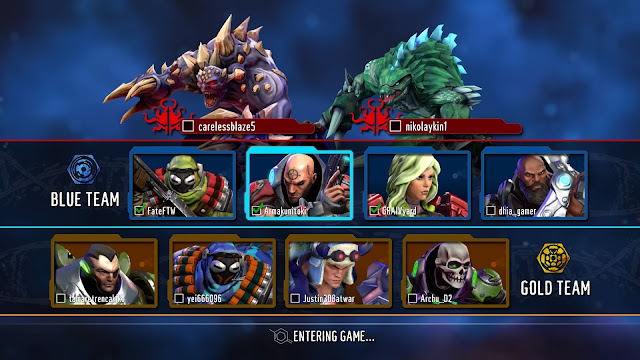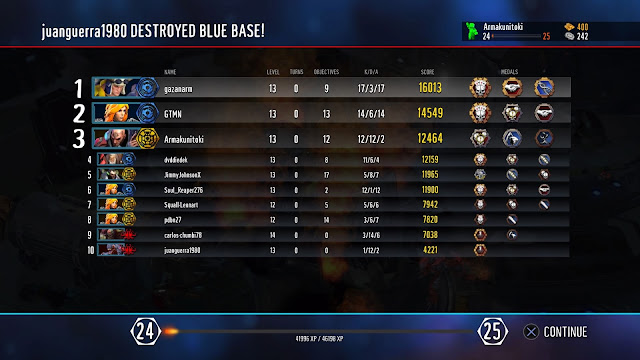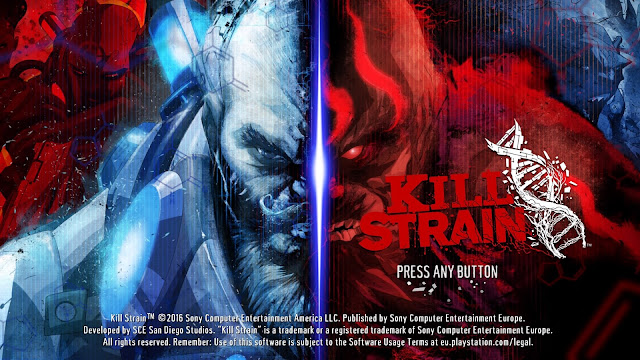Kill Strain — Asymmetry is Controversial
I posted this review originally on Metacritic. The screenshots are added afterwards and represent the game about one year after the review was written.
I've played Kill Strain for a few days now. Overall I think the game has potential but it needs more content to keep my interest.
I've played Kill Strain for a few days now. Overall I think the game has potential but it needs more content to keep my interest.
Good
Two original concepts; asymmetric team setup, and scoring based on a players' performance throughout a match and not on the final outcome of a match. The original concepts are refreshing but also seem to trouble the gameplay. I'll explain more below.
 |
| Asymmetric teams: one mutant team and two human teams, all opposing each other. |
Bad
Lack of variation and content. There's only one map, and you start with only two(?) playable characters. Leveling up your account doesn't seem to add up to much; after a dozen levels or so you unlock more slots for upgrading your characters.
Gameplay feels often a bit chaotic. Because people don't seem to know what they should be doing at times it's difficult to play well and enjoy the game to its full potential. Because of this, what happens during gameplay tends to be more random than based on your own tactics, successes, and failures. There is a team communication system based on predefined messages but it's inefficient in getting your teammates to work with you towards the same goal.
I think the chaos of gameplay has a lot to do with the original team setup of the game. Each match has three teams: one team of two mutants, and two teams of four mercenaries. A few minutes into a match the mutants gain the ability to turn a downed mercenary into a mutant. A match ends when any team's base is destroyed, or if all mercenaries are turned, or if the time runs out (20 minutes). Players can and will spontaneously team up with players of other teams in order to gain advantage over the third team. Most often I've seen matches where mercs team up against mutants, but it's also not uncommon to see the merc teams fight each other.
Because of this team setup players seem a bit confused as to what is beneficial to do. There is no clear enemy, and if you're accustomed to two-team games, it's not that easy to read in Kill Strain which team has the upper hand at any given time and who should you be fighting.
This leads me to the big question I've been asking myself when playing Kill Strain: What is my goal in a match? First of all, there is no winning team. The game speaks consistently about a match "ending", not that someone is "winning". If you destroy another team's base, you don't get any special bonus or mention. You have just ended the game, and that's it. What does matter is what have you done during the game. This is the second original idea in Kill Strain. It's not about winning the match (as in overcoming the opposing teams) but about performing well yourself. You can have all your fellow mercs turned into mutants and have your base destroyed and still come out on top in the final standings. It's all about how you play and not about how the match ended.
The game counts scores for each player based on their kills, damage output, and certain other actions in the game. You are also awarded medals for the actions. At the end of a match you see the final standings, how much players scored and which medals they got. The standings rate each player as an individual.
Playing a merc and getting turned into a mutant is tough for the player. Intuitively it feels like you just lost the game. You're no longer part of your original team. It may be that your original team is now taking a beating, losing structures and getting more mercs turned. But if you look at the scoring system, you haven't lost anything. You're now suddenly a member of the mutant team. The game continues. You can now attack all the mercs, including your former teammates. This is mentally somewhat controversial, and I think some players will have a hard time accepting it. In the scoring and gameplay mechanics you never really lose the game, no matter what happens, but inside your head you may feel like you're being overpowered and beaten to a bitter defeat.
Due to these original design choices, Kill Strain is controversial but taken with an open mind it does provide enjoyable action with a bit of team-based tactics. Maybe San Diego Studios could convince more players to like the game if the in-game presentation alleviated a player's feeling of defeat and emphasized more that success is based on scoring, and score can be accumulated in all situations.
-Ville
 |
| Character upgrades are mostly based on adding percentages to existing skills. |
Analysis
It would be nice to have a couple of maps more to bring variation to tactics in a match and also different visual themes for eye candy. The one map does work pretty well, though. It can take quite a while to grind your way to unlock more playable characters. Also, I'm concerned that the characters all play quite a lot alike. I've played three characters so far and the main difference between them seems to be how much damage output they have and how to escape tough situations. I keep wishing for more depth and differences in the characters. It may also be partly due to the pretty hectic twin-stick gameplay that the gameplay is more action than tactics.Gameplay feels often a bit chaotic. Because people don't seem to know what they should be doing at times it's difficult to play well and enjoy the game to its full potential. Because of this, what happens during gameplay tends to be more random than based on your own tactics, successes, and failures. There is a team communication system based on predefined messages but it's inefficient in getting your teammates to work with you towards the same goal.
 |
| Three teams fighting for control of the drop zone in order to get the upper hand in the match. |
I think the chaos of gameplay has a lot to do with the original team setup of the game. Each match has three teams: one team of two mutants, and two teams of four mercenaries. A few minutes into a match the mutants gain the ability to turn a downed mercenary into a mutant. A match ends when any team's base is destroyed, or if all mercenaries are turned, or if the time runs out (20 minutes). Players can and will spontaneously team up with players of other teams in order to gain advantage over the third team. Most often I've seen matches where mercs team up against mutants, but it's also not uncommon to see the merc teams fight each other.
Because of this team setup players seem a bit confused as to what is beneficial to do. There is no clear enemy, and if you're accustomed to two-team games, it's not that easy to read in Kill Strain which team has the upper hand at any given time and who should you be fighting.
This leads me to the big question I've been asking myself when playing Kill Strain: What is my goal in a match? First of all, there is no winning team. The game speaks consistently about a match "ending", not that someone is "winning". If you destroy another team's base, you don't get any special bonus or mention. You have just ended the game, and that's it. What does matter is what have you done during the game. This is the second original idea in Kill Strain. It's not about winning the match (as in overcoming the opposing teams) but about performing well yourself. You can have all your fellow mercs turned into mutants and have your base destroyed and still come out on top in the final standings. It's all about how you play and not about how the match ended.
 |
| The match ended because the blue base was destroyed. Which team won? |
The game counts scores for each player based on their kills, damage output, and certain other actions in the game. You are also awarded medals for the actions. At the end of a match you see the final standings, how much players scored and which medals they got. The standings rate each player as an individual.
Playing a merc and getting turned into a mutant is tough for the player. Intuitively it feels like you just lost the game. You're no longer part of your original team. It may be that your original team is now taking a beating, losing structures and getting more mercs turned. But if you look at the scoring system, you haven't lost anything. You're now suddenly a member of the mutant team. The game continues. You can now attack all the mercs, including your former teammates. This is mentally somewhat controversial, and I think some players will have a hard time accepting it. In the scoring and gameplay mechanics you never really lose the game, no matter what happens, but inside your head you may feel like you're being overpowered and beaten to a bitter defeat.
 |
| A human is being dragged into the strain and will unwillingly elope to the mutant team. |
Due to these original design choices, Kill Strain is controversial but taken with an open mind it does provide enjoyable action with a bit of team-based tactics. Maybe San Diego Studios could convince more players to like the game if the in-game presentation alleviated a player's feeling of defeat and emphasized more that success is based on scoring, and score can be accumulated in all situations.
-Ville

Comments
Post a Comment